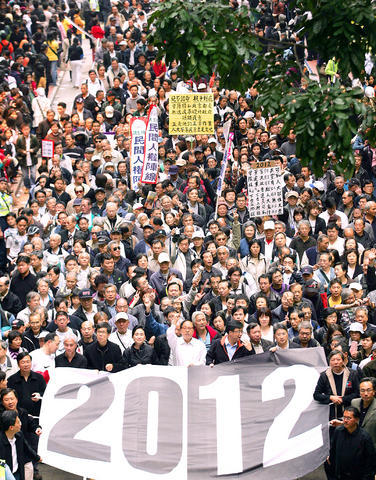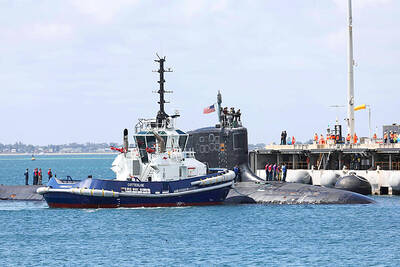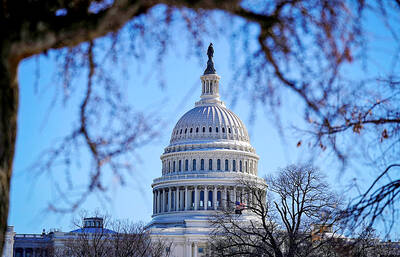Thousands marched through Hong Kong yesterday, calling for the right to elect their government by 2012 -- a date leaders in Beijing have ruled out.
The march, joined by religious, political and civil leaders, was the latest in a series of protests by residents angry that they will have to wait at least another decade before they can choose their own leader and legislators.
"We are ready now," shouted hundreds of people at Victoria Park, where they gathered waving flags, singing songs and chanting prayers before setting off on the march. Police put the number of people leaving the park at 6,800.

PHOTO: AFP
Organizers said about 20,000 people joined the march.
Li Luk-yan, 45, and his wife, Irene Siu, were in the crowd with their two young sons.
"At some point, we'll have to pass the baton to them. They need to understand what democracy means and why we need to keep fighting," Li, a publishing executive, said.
Beijing announced last month that its semiautonomous region could elect its own leader in 2017 and all of its legislators sometime after that, possibly 2020 at the earliest.
The announcement came as a bitter blow to the territory, where most had hoped for 2012. Many are also doubtful that Beijing will deliver on that pledge.
Hong Kong has a vast amount of financial and personal liberties, including the right to hold protests and criticize the government -- freedoms not allowed elsewhere in China.
Still, residents are unhappy that they cannot have a greater say in who runs their government.
Hong Kong's leader is currently chosen by an 800-member committee dominated by Beijing loyalists, including many of the city's influential tycoons. Only half of the territory's 60 lawmakers are elected, with the rest are picked by special interest groups.
"If Hong Kong's leader is elected by the people, he has to be accountable to the people, not to the business community as he is now," Li said.
Beijing has consistently ruled out allowing the booming financial center of 6.9 million people to directly elect its representatives, arguing that the territory is not yet politically mature enough to do so.
Many of Hong Kong's activists and lawmakers have been outspoken critics of human rights violations in China. Some, like the founder of the main opposition Democratic Party, Martin Lee (
A barrister-turned-lawmaker, Lee told reporters that the rally sent a strong message to Beijing that Hong Kong people wanted "real, genuine democracy."
The democrats have dismissed Beijing's announcement as an empty gesture. They say not only are there no guarantees that direct elections for the chief executive will take place in 2017, but that candidates will still need to be put forward by a nomination committee, the makeup of which has not yet been agreed.
"There are so many blanks in this proposal," Lee said. "We still don't know if we will have genuine elections for all of the legislature in 2020 or what the screening procedure will be like for the chief executive. We demand to know all the details."

CSBC Corp, Taiwan (台灣國際造船) yesterday released the first video documenting the submerged sea trials of Taiwan’s indigenous defense submarine prototype, the Hai Kun (海鯤), or Narwhal, showing underwater navigation and the launch of countermeasures. The footage shows the vessel’s first dive, steering and control system tests, and the raising and lowering of the periscope and antenna masts. It offered a rare look at the progress in the submarine’s sea acceptance tests. The Hai Kun carried out its first shallow-water diving trial late last month and has since completed four submerged tests, CSBC said. The newly released video compiles images recorded from Jan. 29 to

DETERRENCE EFFORTS: Washington and partners hope demonstrations of force would convince Beijing that military action against Taiwan would carry high costs The US is considering using HMAS Stirling in Western Australia as a forward base to strengthen its naval posture in a potential conflict with China, particularly over Taiwan, the Wall Street Journal reported on Saturday. As part of its Indo-Pacific strategy, Washington plans to deploy up to four nuclear-powered submarines at Stirling starting in 2027, providing a base near potential hot spots such as Taiwan and the South China Sea. The move also aims to enhance military integration with Pacific allies under the Australia-UK-US trilateral security partnership, the report said. Currently, US submarines operate from Guam, but the island could

RESTRAINTS: Should China’s actions pose any threat to Taiwan’s security, economic or social systems, China would be excluded from major financial institutions, the bill says The US House of Representatives on Monday passed the PROTECT Taiwan Act, which states that Washington would exclude China from participating in major global financial organizations if its actions directly threaten Taiwan’s security. The bill, proposed by Republican Representative Frank Lucas, passed with 395 votes in favor and two against. It stipulates that if China’s actions pose any threat to Taiwan’s security, economic or social systems, the US would, “to the maximum extent practicable,” exclude Beijing from international financial institutions, including the G20, the Bank for International Settlements and the Financial Stability Board. The bill makes it clear that China must be prepared

Taiwanese trade negotiators told Washington that Taipei would not relocate 40 percent of its semiconductor production to the US, and that its most advanced technologies would remain in the nation, Vice Premier Cheng Li-chiun (鄭麗君) said on Sunday. “I told the US side very clearly — that’s impossible,” Cheng, who led the negotiation team, said in an interview that aired on Sunday night on Chinese Television System. Cheng was referring to remarks last month by US Secretary of Commerce Howard Lutnick, in which he said his goal was to bring 40 percent of Taiwan’s chip supply chain to the US Taiwan’s almost